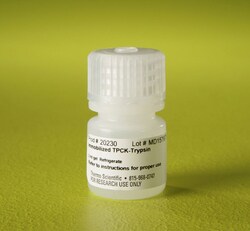Thermo Scientific™ Immobilized Trypsin, TPCK Treated (Agarose Resin), 2mL
Catalog No :
CAS Number :
Brand :
In Stock
Specifications:
| Application | Cell culture | ||
| Storage Temperature | 2-8°C | ||
| Product Type | Enzymes | Forms | Liquid |
| Product Brand | Thermo Fisher Scientific™ | ||
The Thermo Scientific Pierce Immobilized TPCK Trypsin is a serine endoprotease immobilized on agarose resin. Designed for amino acid analysis, protein sequencing, and structural studies, this immobilized form offers key advantages such as minimized autolysis, reduced sample contamination, and enhanced stability. The immobilized format allows for easy sample separation after digestion or affinity purification of trypsin inhibitors.
Key Features
- Selective Cleavage:
- Cleaves peptide bonds at the carboxyl side of arginine and lysine residues.
- Offers high specificity, regardless of peptide length or sequence.
- Immobilized Format Advantages:
- Allows easy separation of trypsin from cleavage products.
- Reduces autolysis, extending the enzyme's usability.
- Prevents contamination of samples with the enzyme.
- Enhanced Stability:
- More resistant to heat-induced denaturation.
- Maintains enzymatic activity for longer durations compared to free trypsin.
- Optimal Digestion Conditions:
- pH: 7.5–9.0.
- Temperature: 37°C.
Applications
- Protein Sequencing and Analysis:
- Preparation of tryptic fragments for Edman degradation sequencing.
- Structural studies and peptide mapping.
- Cell Culture:
- Removal of adherent cells from tissue culture flasks.
- Affinity Purification:
- Purify soybean trypsin inhibitors using immobilized trypsin.
- Mass Spectrometry Workflows:
- Recommended for downstream applications with Pierce Trypsin, MS Grade (Part No. 90057).
Technical Specifications
| Feature | Details |
|---|---|
| Description | Pierce Immobilized Trypsin, TPCK Treated |
| Form | Liquid Suspension |
| Quantity | 2 mL of settled gel (50% slurry) |
| Product Type | Trypsin (Immobilized) |
| Storage Conditions | Store at 4°C upon receipt |
| Shipping Condition | Shipped at ambient temperature |
| Contents | Glycerol, 0.05% sodium azide |
Preparation and Usage
- Preparation:
- Supplied as a 50% slurry.
- Ready-to-use for digestion workflows; adjust buffer and pH as required.
- Digestion Protocol:
- Incubate samples with immobilized trypsin at pH 7.5–9.0 and 37°C.
- After digestion, separate the enzyme from cleavage products using standard centrifugation or filtration methods.
Key Advantages
- Minimized Autolysis:
- Immobilization prevents self-digestion, preserving enzyme integrity.
- Ease of Separation:
- Simplifies workflows by allowing trypsin removal post-digestion.
- Enhanced Stability:
- Maintains activity over longer periods due to resistance to denaturation.
- Reduced Contamination:
- Keeps samples free from protease contamination for clean downstream analysis.
Related Products
- Trypsin, TPCK Treated:
- Free form for non-immobilized applications.
- Pierce Trypsin, MS Grade (Part No. 90057):
- Optimized for mass spectrometry workflows.
Why Choose Immobilized TPCK Trypsin?
The Thermo Scientific Pierce Immobilized TPCK Trypsin is ideal for researchers seeking a robust, stable, and easily separable enzymatic tool for protein analysis and sequencing. Its immobilized format ensures precision, simplifies workflows, and enhances stability, making it an excellent choice for advanced proteomics and molecular biology applications.
Comparison Between Thermo Scientific™ Immobilized Trypsin, TPCK Treated and Trypsin, TPCK Treated
| Feature | Immobilized Trypsin, TPCK Treated | Trypsin, TPCK Treated |
|---|---|---|
| Form | Liquid suspension with agarose resin (immobilized enzyme) | Powder form |
| Primary Advantage | Immobilized for easy separation and reduced contamination | Free form for flexibility in solution-based reactions |
| Applications | Protein sequencing, peptide mapping, affinity purification, structural studies | Protein sequencing, peptide mapping, structural studies |
| Contamination Control | Eliminates contamination of samples with protease | Can contaminate samples if not fully removed |
| Stability | Enhanced stability against heat-induced denaturation due to immobilization | Moderate stability, susceptible to autolysis |
| Autolysis | Minimal autolysis due to immobilization | Potential for autolysis during extended reactions |
| Ease of Use | Allows easy removal of enzyme after digestion | Requires separation techniques like filtration or dialysis |
| Optimal Digestion Conditions | pH 7.5–9.0, 37°C | pH 7.5–9.0, 37°C |
| Specificity | Cleaves at carboxyl side of arginine and lysine residues | Cleaves at carboxyl side of arginine and lysine residues |
| Storage Conditions | 4°C in original container | Store as powder at 2–8°C |
| Format Flexibility | Limited to resin-bound applications | Can be dissolved for any solution-based workflows |
| Use in High-Throughput Workflows | Ideal for applications requiring enzyme removal or extended activity | Ideal for quick solution-based digestion processes |
| Applications in Cell Culture | Removal of adherent cells, affinity purification | Removal of adherent cells |
| Quantity | 2 mL of settled gel (50% slurry) | 50 mg powder |
| Reusability | Can be reused in multiple experiments due to immobilization | Single-use enzyme |
Key Advantages
Immobilized Trypsin, TPCK Treated
- Ease of Separation: Enzyme removal is straightforward post-digestion using centrifugation or filtration.
- Stability: Immobilization enhances stability and reduces heat-induced denaturation.
- Minimal Contamination: Keeps samples protease-free after digestion.
- Reusability: Resin can be reused, making it cost-effective for certain applications.
Trypsin, TPCK Treated
- Flexibility: Powder form allows solution-based reactions with no format restrictions.
- Versatility: Suitable for quick, single-use experiments where enzyme separation is not required.
- Simpler Preparation: Directly dissolvable in buffer for immediate use.
When to Choose Each
| Scenario | Recommended Product |
|---|---|
| Need for easy enzyme removal | Immobilized Trypsin, TPCK Treated |
| High stability and minimal autolysis required | Immobilized Trypsin, TPCK Treated |
| Single-use, solution-based workflows | Trypsin, TPCK Treated |
| High flexibility in preparation and use | Trypsin, TPCK Treated |
| Reuse of enzyme in multiple reactions | Immobilized Trypsin, TPCK Treated |
- Immobilized Trypsin, TPCK Treated is ideal for workflows requiring sample purity, reduced contamination, and reusability, especially in structural studies or affinity purification.
- Trypsin, TPCK Treated is preferred for versatile, solution-based applications where enzyme removal is not critical.
Your choice depends on whether you prioritize ease of separation and stability (Immobilized Trypsin) or flexibility and versatility (Trypsin in powder form).




 0
0
